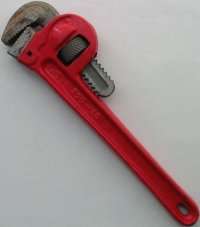wrench
English
Alternative forms
- (15th century): wrenche; (15th century): wrinche; (16th century): wringe
Pronunciation
- enPR: rĕnch IPA(key): /ɹɛnt͡ʃ̩̩/
Audio (US) (file) - Rhymes: -ɛntʃ
Etymology 1
From Middle English wrench, from Old English wrenċ, from Proto-Germanic *wrankiz (“a turning, twisting”). Compare German Rank (“plot, intrigue”).
Noun
wrench (plural wrenches)
A double-sided wrench.

A pipe/adjustable wrench.
- A movement that twists or pulls violently; a tug. [From XVI century.]
- 1897, Bram Stoker, Dracula Chapter 21
- With a wrench, which threw his victim back upon the bed as though hurled from a height, he turned and sprang at us.
- 1897, Bram Stoker, Dracula Chapter 21
- An injury caused by a violent twisting or pulling of a limb; strain, sprain. [From XVI century.]
- (obsolete) A trick or artifice. [From VIII century.]
- c. 1210, MS. Cotton Caligula A IX f.246
- Mon mai longe liues wene; / Ac ofte him liedh the wrench.
- c. 1210, MS. Cotton Caligula A IX f.246
- (obsolete) Deceit; guile; treachery. [From XIII century.]
- (obsolete) A turn at an acute angle. [From XVI century.]
- (archaic) A winch or windlass. [From XVI century.]
- (obsolete) A screw. [From XVI century.]
- A distorting change from the original meaning. [From XVII century.]
- (US) A hand tool for making rotational adjustments, such as fitting nuts and bolts, or fitting pipes; a spanner. [From XVIII century.]
- (Britain) An adjustable spanner used by plumbers.
- A violent emotional change caused by separation. [From XIX century.]
- (physics) In screw theory, a screw assembled from force and torque vectors arising from application of Newton's laws to a rigid body. [From XIX century.]
- (obsolete) means; contrivance
- (Can we find and add a quotation of Francis Bacon to this entry?)
- In coursing, the act of bringing the hare round at less than a right angle, worth half a point in the recognised code of points for judging.
Synonyms
- (tool): spanner (UK, Australia)
Derived terms
Terms derived from wrench (noun)
- pipe wrench
- screw wrench
- torque wrench
- torsion wrench
- tube wrench
- dog bone wrench
Translations
violent twisting movement
injury caused by a violent twisting or pulling of a limb
turn at an acute angle
screw — see screw
distorting change from the original meaning
hand tool
|
|
violent emotional change caused by separation
physics: screw assembled from force and torque vectors
Etymology 2
From Middle English wrenchen, from Old English wrenċan, from Proto-Germanic *wrankijaną. Compare German renken.
Verb
wrench (third-person singular simple present wrenches, present participle wrenching, simple past and past participle wrenched)
- (intransitive, obsolete) To violently move in a turn or writhe. [From XI century.]
- (transitive) To pull or twist violently. [From XIII century.]
- With a surge of adrenaline, she wrenched the car door off and pulled out the injured man.
- (transitive, obsolete) To turn aside or deflect. [From XIII century.]
- (transitive, obsolete) To slander. [From XIV century.]
- (transitive, obsolete) To tighten with or as if with a winch. [From XVI century.]
- (transitive) To injure (a joint) by pulling or twisting. [From XVI century.]
- Be careful not to wrench your ankle walking along those loose stones!
- (transitive) To distort from the original meaning. [From XVI century.]
- (transitive, obsolete) To thrust a weapon in a twisting motion. [From XVI century.]
- (intransitive, fencing, obsolete) To disarm an opponent by whirling his or her blade away. [From XVIII century.]
- (transitive) To rack with pain. [From XVIII century.]
- (transitive) To deprive by means of a violent pull or twist. [From XVIII century.]
- (transitive) To use the tool known as a wrench. [From XIX century.]
- The plumber wrenched the pipes until they came loose.
Translations
to pull or twist
|
to sprain a joint
to use a wrench
|
|
Further reading

This article is issued from
Wiktionary.
The text is licensed under Creative
Commons - Attribution - Sharealike.
Additional terms may apply for the media files.